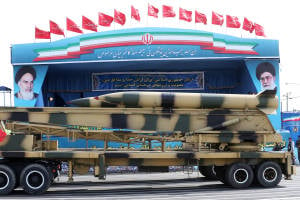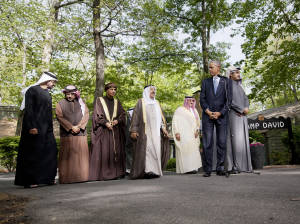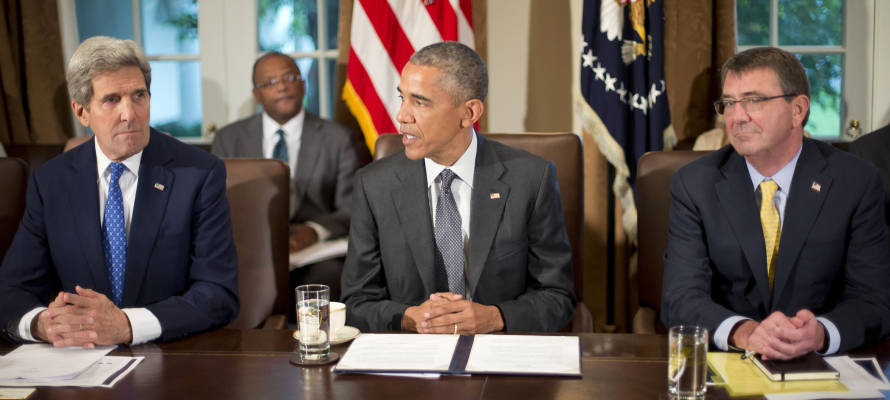In an interview with The Atlantic, President Obama defended his public criticism of Israel as being in the best interests of the Jewish state while insisting that a deal with Iran poses no danger to Israel or the Arab Gulf states.
US President Barack Obama defended his public criticism of Israel and the Iranian nuclear deal in an interview last week with The Atlantic’s Jeffrey Goldberg. Obama rejected the opinion that the nuclear agreement would spark a Middle East arms race and free up significant funds for Iran’s proxies. He also denied that criticizing Israel represented a weakening of bilateral relations.
Goldberg quoted Obama’s justification for speaking out against Israel at times that many Jews, both in Israel and abroad, felt were inappropriate and undeserving.
“Obama told me that when Netanyahu asserted, late in his recent reelection campaign, that ‘a Palestinian state would not happen under his watch, or [when] there [was] discussion in which it appeared that Arab-Israeli citizens were somehow portrayed as an invading force that might vote, and that this should be guarded against—this is contrary to the very language of the Israeli Declaration of Independence, which explicitly states that all people regardless of race or religion are full participants in the democracy. When something like that happens, that has foreign-policy consequences, and precisely because we’re so close to Israel, for us to simply stand there and say nothing would have meant that this office, the Oval Office, lost credibility when it came to speaking out on these issues.’”
According to Obama, criticizing Israel is an important part of protecting it. “Precisely because I care so deeply about the State of Israel, precisely because I care so much about the Jewish people, I feel obliged to speak honestly and truthfully about what I think will be most likely to lead to long-term security and will best position us to continue to combat anti-Semitism.”

An IDF checkpoint. (Nati Shohat/Flash90)
Obama mentioned security checkpoints and travel restrictions, which have been nearly 100% effective in stopping Palestinian terrorist attacks against Israeli civilians, as an example of Israeli policy deserving of criticism. He also censured the building of so-called settlements, despite his professed belief in “the right of the Jewish people to have a homeland.”
As for Iran, Obama maintains that Israel is not threatened by the Islamic Republic because, “at the margins, where the costs are low, they [Iranians] may pursue policies based on hatred [of Jews] as opposed to self-interest. But the costs here are not low, and what we’ve been very clear [about] to the Iranian regime over the past six years is that we will continue to ratchet up the costs, not simply for their anti-Semitism, but also for whatever expansionist ambitions they may have. That’s what the sanctions represent. That’s what the military option I’ve made clear I preserve represents.”

Missiles on parade at Iran’s Army Day celebration.(AP/Ebrahim Noroozi)
Over the course of the nuclear negotiations, Iran has continued to call for Israel’s destruction, including chants of “Death to Israel” at its annual Army Day celebration and statements by Iranian leadership indicating that the destruction of Israel is non-negotiable.
Obama also rejected the assertion that allowing Iran to maintain its nuclear infrastructure intact would encourage a nuclear arms race in the Gulf. “Part of the reason why [the GCC states] would not pursue their own nuclear program—assuming that we have been successful in preventing Iran from continuing down the path of obtaining a nuclear weapon—is that the protection that we provide as their partner is a far greater deterrent than they could ever hope to achieve by developing their own nuclear stockpile or trying to achieve breakout capacity when it comes to nuclear weapons, and they understand that,” he said.

Obama meets with GCC leaders at Camp David. (AP/Pablo Martinez Monsivais)
When Goldberg noted that Saudi Prince Turki al-Faisal indicated that his country would match Iran’s nuclear progress, Obama dismissed the comment by saying that al-Faisal is not a member of the Saudi government. He insisted that no GCC state has told him that it would consider pursuing a nuclear program.
Regarding sanctions against Iran, Obama believes that lifting them will not have a major impact on the Iranian Revolutionary Guard Corps or on Iran’s regional proxies, especially Hezbollah. “[The Iranians] are not a threat to the region because of their hardware…. The big problems we have are weapons going in to Hezbollah, or them sending agents into Yemen, or other low-tech asymmetric threats that they’re very effective at exploiting, which they’re already doing—they’ve been doing despite sanctions…. The issue though with respect to rockets in south Lebanon is not whether [Iran has] enough money to do so. They’ve shown a commitment to doing that even when their economy is in the tank.”
By: Sara Abramowicz, United with Israel
Send Passover Packages to Needy Israeli Soldiers - Bring Them Joy!
We are honored to thank the young men and women of the IDF who risk their lives every day to protect the citizens of Israel. Since October 7th, soldiers have been on the battlefield for months - many are hoping to come home for Passover.
Join us in sending Passover food packages (and personal notes) to Israeli soldiers and their families.
Many soldiers spend the Passover holiday with needy families back home. The soldiers greatly appreciate your love and concern. Bring them Passover joy!
CLICK HERE TO SEND YOUR PACKAGE AND NOTE TO ISRAELI SOLDIERS!




